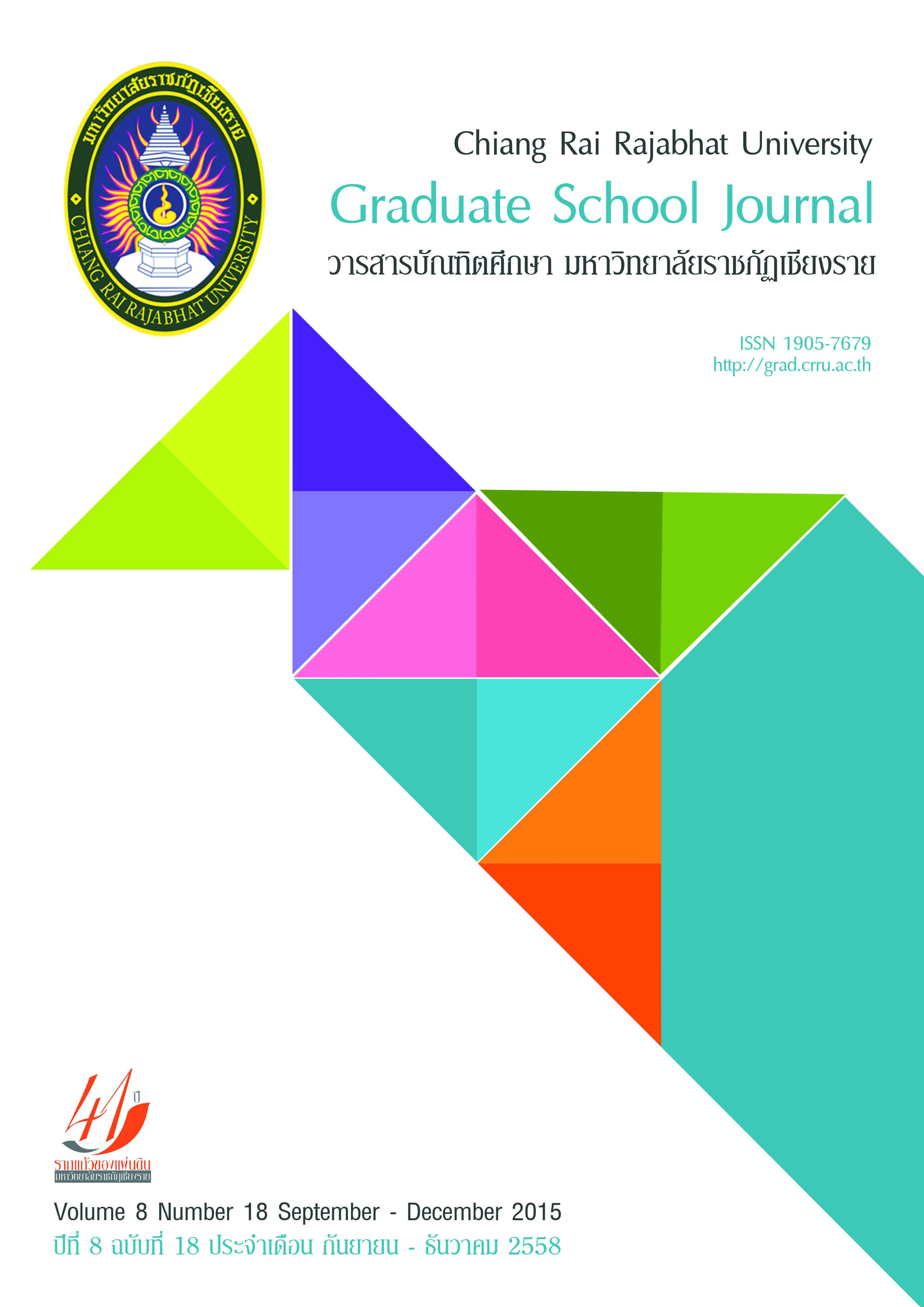การประเมินหลักสูตรครุศาสตรมหาบัณฑิต มหาวิทยาลัยราชภัฏเชียงราย โดยใช้รูปแบบการวิเคราะห์ระบบ (System Analysis Model)
Main Article Content
บทคัดย่อ
ผลการศึกษาพบว่า
การประเมินหลักสูตรครุศาสตรมหาบัณฑิตของมหาวิทยาลัยราชภัฏเชียงราย ด้วยรูปแบบการวิเคราะห์ระบบ (System Analysis Model) พบว่า การประเมินหลักสูตรครุศาสตรมหาบัณฑิตของมหาวิทยาลัยราชภัฏเชียงราย โดยภาพรวมผลการประเมินอยู่ใน ระดับดี
1. การประเมินด้านปัจจัยเบื้องต้น พบว่า ทั้งวัตถุประสงค์ของหลักสูตร โครงสร้างของหลักสูตร เนื้อหาของหลักสูตร และสิ่งอำนวยความสะดวกของหลักสูตร โดยภาพรวมผลการประเมินอยู่ในระดับดี
2. การประเมินด้านกระบวนการ พบว่า สภาพการเรียนการสอนและนการวัดและประเมินผล โดยภาพรวมผลการประเมิน อยู่ในระดับดี
3. การประเมินด้านผลผลิต พบว่า คุณภาพของมหาบัณฑิต โดยภาพรวมผลการประเมินอยู่ในระดับดี ข้อเสนอแนะเพิ่มเติมเกี่ยวกับการประเมินหลักสูตรครุศาสตรมหาบัณฑิตของมหาวิทยาลัยราชภัฏเชียงราย พบว่า ข้อที่ มีความถี่สูงสุด ได้แก่ อาจารย์ควรตรงต่อเวลา ควรมีการเตรียมการสอน และควรมีเทคนิคการสอนที่นำเข้าสู่บทเรียนได้น่าสนใจ รองลงมา คือ มีการวัดและประเมินนิสิตอย่างถูกต้อง โปร่งใส และยุติธรรม และการตรวจรูปแบบวิทยานิพนธ์ควรดำเนินการให้ เร็วขึ้น ตามลำดับ
A System Analysis Model-Based Curriculum Evaluation of Master’s Degree of Education in Chiang Rai Rajabhat University
The purpose of this study aimed to evaluate the master’s degrees of education of Chiang Rai Rajabhat University with emphasis on the application of system analysis model. For data collection, a questionnaire was conducted with 1,072 respondents as a sample group. These included 21 M.Ed. curriculum committee of Chiang Rai Rajabhat University; 400 incoming graduate students studying in the master’s degree of education and conducting their thesis from the year 2010 to 2011; furthermore, 267 M.Ed. new graduates, and 384 education-related employers. The data were statistically analyzed using percentage, mean, and standard deviation.
The findings of the study revealed that the system analysis model-based evaluation for master’s degree of education in Chiangrai Rajabhat University, with an overall rate of higher level, was as follows:
1. In terms of the basic factors, it was stated that the evaluation for the master’s degree of education in relations to its curriculum objectives, curriculum structures, contents, and facilities was rated at a good level;
2. In terms of the curriculum process, it was stated that the evaluation for the master’s degree of education in relations to its instructional management and learning evaluation was rated at a good level;
3. In terms of the output, it was stated that the evaluation for the master’s degree of education in relations to graduates’ educational quality was also rated at a good level. Also, the detailed suggestions for the evaluation for the master’s degree of education in Chiang Rai Rajabhat University, it was, overall, stated that the lecturers’ on-time and well-prepared instructional managements together with their various teaching techniques were mostly observed, followed by their students’ fair learning evaluation, and quicker thesis format-checking.
Article Details
บทความที่ได้รับการตีพิมพ์เป็นลิขสิทธิ์ของวารสารมหาวิทยาลัยราชภัฎเชียงราย
ข้อความที่ปรากฏในบทความแต่ละเรื่องในวารสารวิชาการเล่มนี้เป็นความคิดเห็นส่วนตัวของผู้เขียนแต่ละท่านไม่เกี่ยวข้องกับมหาวิทยาลัยราชภัฎเชียงราย และคณาจารย์ท่านอื่นๆในมหาวิทยาลัยฯ แต่อย่างใด ความรับผิดชอบองค์ประกอบทั้งหมดของบทความแต่ละเรื่องเป็นของผู้เขียนแต่ละท่าน หากมีความผิดพลาดใดๆ ผู้เขียนแต่ละท่านจะรับผิดชอบบทความของตนเองแต่ผู้เดียว


